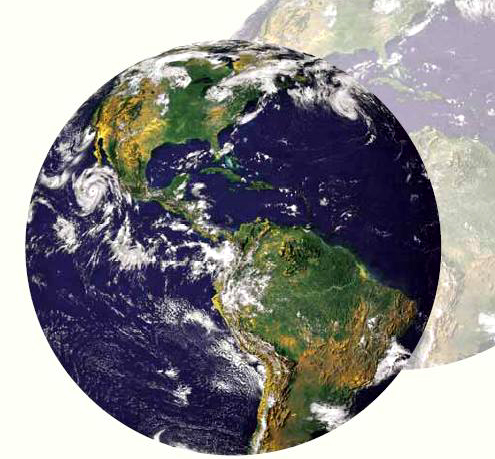|
|
|
|
A Strategy For A Sustainable Planet Earth
Sustainable Development
Responsible Prosperity
By Christos Papoutsy
|
|
Sustainable development focuses on improving the quality of life for all the earth’s citizens without increasing the use of material resources beyond the capacity of the environment to supply them indefinitely.
Around the world we see signs of severe stress on our interlocked global economics, environmental and social systems. We are faced with freshwater shortages and tropical forest obstruction, species extinction, urban air pollution, and climate changes.
|
|
How do we reverse these negative trends? The World Commission on Environment and Development recommended seven critical actions needed to ensure a good quality of life for people around the world:
|
- Revive growth
- Change the quality of growth
- Meet essential needs – aspirations
- Ensure a sustainable level of population
- Conserve and enhance the resource base
- Reorient technology and manage risk
- Include and combine environmental and economic considerations in decision-making.
|
These recommendations are a call to change our actions and to do things differently. In particular, they underscore a need to: produce differently, consume differently, organize ourselves differently.
To produce differently, we must increase efficiency and also significantly increase the reuse of materials. Eco-efficient companies and industries must deliver competively priced goods and services that improve people’s quality of life, while relieving ecological impacts and resources.
|
Globally, the goal is to quadruple resource productivity so that wealth is doubled, and resources use is halved. (This concept is known a factor four)
However, because OECD countries are responsible for material flows five times as high a developed countries, and world population continues to rise, it will be necessary for OECD countries to reduce their per capital materials use by a factor of ten. Implementary factor four and factor ten strategies will require us to think about the cradle-too grave impact of all goods and services to make wise choices. It will also require a reorientation of industrial economics – reducing the scale of polluting activities and creating new opportunities for entrepreneurs.
To consume differently we must carefully monitor and measure the extent of our consumption that is registered in the ecological footprint. From the ecological footprint, we can monitor and project how much productive land and water we need to produce all the resources we consume and to absorb all the water we make. The average American has an ecological footprint 1.7 times larger than a person of Sweden, 3.8 times that of someone in Hungry and Costa Rica, and more than 9 times that of an individual in India.
We need to shift how we make decisions, as consumers, from thinking about means to thinking about ends. Governments and businesses need to collaborate to meet people’s transportation needs by increasing in improved public transportation rather than building new roads. They need to also work together with communities to press new zoning laws that allows people to live, work and shop within the same neighborhood. This would minimize people’s needs for transportation while improving the accessibility of what they really want – goods and services.
To produce and consume differently, we need to ORGANIZE OURSELVES DIFFERENTLY. The way we organize ourselves and establish rules to govern our actions will play a major role in determining whether we move toward more sustainable paths.
Good governance will require reforming decision-making processes to increase opportunities for public participation, including a wide variety of activities ranging from consultation hearings as part of an environmental impact assessments, to co-management of natural resources.
Public participation can:
|
- Help establish good pathways for sustainable development
- Enhance understanding and relationships
- Increase eagerness to participate, leaders to better implementation of decisions
- Enrich the community and build social capital
|
Reducing corruption, the misuse of power for private benefit or advantage, is also necessary to achieve Sustainable development.
Sustainable development is a fluid concept that will continue to evolve over time but that will continue to evolve over time but common characteristics underlie the many streams of thought. Sustainable development emphasizes the need for:
|
- Concern for equity and fairness – ensuring the rights of the poor and future generations.
- Long-term view – applying the precautionary principle
- Systems thinking – understanding the interconnection between the environment, economy and society
|
The goal needs to be a “sustainable development for responsible prosperity. Only by participating will we be able to maintain the health, dignity and freedom of our society.
To read more about sustainability and corporate social responsibility visit http://www.helleniccomserve, “Business Ethics Section” or the Christos and Mary Papoutsy Distinguished Chair in Ethics and Southern New Hampshire University at http:www.shnu.edu
|
|
(Posting date 20 December 2006)
HCS encourages readers to view other articles and releases in our permanent, extensive archives at the URL http://www.helleniccomserve.com/contents.html.
|
|
|
|
2000 © Hellenic Communication Service, L.L.C. All Rights Reserved.
http://www.HellenicComServe.com
|


